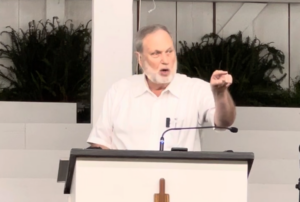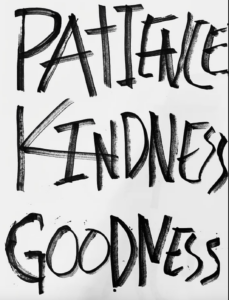Funny, how we humans think.
We assume we’re the only people in the world who have the kind of psychotic, illogical thoughts we have. We say, “If people could hear what is in my head, they’d run screaming from my presence.”
It is a kind of narcissism, really; and we all have it to some degree or another. Either we think of ourselves as better than the people around us, or we think of ourselves as worse than the worst. The common thread with either option is that we think of ourselves. And we assume everyone else is thinking of us, too. This is what we do. On this side of the fall line, the human tendency is to think of ourselves too much, in distorted ways. We think we’re unique in our sin, unique in our brokenness — unique in all the wrong ways.
This is biblical in the sense that we live on this side of Genesis 3. But our self-centered, self-promoting, self-hating thoughts … these are most certainly not biblical. The Bible tells me there is nothing I am going through that isn’t common to everyone. Which means those bizarre, insane thoughts you have are probably a lot like the bizarre, insane thoughts I have. Like you, I scream and cry in private. I melt down and wish God would just strike me dead. Or I rail against everyone else and wish God would strike them dead. Like you, I deal with envious thoughts and doubt-filled thoughts and fearful thoughts (those are my specialty). And I get so angry with God for not fixing everything like I want it. I feel sorry for myself way too much, wondering why I have it worse than all the other pastors in the world.
I’m not above crazy and I know myself well enough to know it will happen again, even if I pray earnestly for God to move me beyond those moments.
If what I’ve described here sounds familiar to you, too, then welcome to the human race.
Here’s the encouragement, for what it is worth: What separates us from the real crazies is our ability to see all those self-centered, unstable thoughts for what they are. They are moments of weakness but they are most likely very normal. They are our truest, most fallen self bleeding through, but they are not evil. They are a fact of the human condition.
When we see our weakness, our sheer humanity, as some degree of separation from God’s best, we understand more intimately why we need a Redeemer. We need someone who can speak for us in the presence of Perfect Love — someone who can say on our behalf, “This one is with me.” We need someone who counters all our distortions of self with knowledge of the created good by which he defines us. We need an Advocate with the Father (see Zechariah 3 for a profound picture of how this works in the Kingdom of God).
You see, while we think of ourselves as unique in all the wrong ways, Christ our Redeemer (the one who spoke us into being), thinks of us as unique in all the right ways. He sees us as we are, and he also sees what he made. More accurately, he sees the image of God. More accurately still, the Father sees us through the filter of Christ. In other words, it is not our behavior or our thoughts or our basest selves that matter. What matters is our proximity to the Redeemer who speaks for us.
In fact, that’s all that matters.
And what Jesus does for us, we are now challenged to do for others. We learn from Christ to be other-focused and to see the best in others … to see what they may not see in themselves. How can we practice seeing people in our path as Christ sees us?
1. Assume the best.
Do you tend to be trusting or suspicious of people? We tend to see in others what we see in ourselves. Do you see the best or worst?
2. Address the gaps.
They say that in the absence of information, we assume the worst. Rather than filling gaps with suspicion, we would all do well to learn to ask for help in understanding. Where there is a gap, assume the best and lean in, as Christ has for us.
3. Learn to bend.
Isaiah writes, “A bruised reed he will not break, and a smoldering wick he will not snuff out.” Love does not default to defensiveness, does not self-protect at the expense of others. Love bends … and doesn’t break.
4. Build on their gifts.
Your mother said if you can’t say something nice, don’t say anything at all. At the risk of disagreeing with your mom, I disagree. If you can’t say something nice about someone, why is that? What has you so jaded about the human race that you can’t find one nice thing to hang your hat on, can’t find one redeeming quality in another child of God? Instead, why not find at least one strength and build on it?
5. In your anger, do not sin.
This comes straight from Paul. I love how he words it. He tells me I am going to be angry sometimes. I appreciate that permission. But my anger never gives me permission to “break a bruised reed.” If I find myself dealing with too much impatience, too short a fuse, I may need to examine what has me living too close to the edge.
Chances are, it isn’t them; its me.








